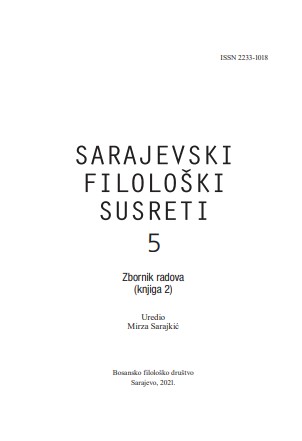Proricanje sudbine čovječanstva u dramama Antona Pavloviča Čehova
Foretelling the Fate of Mankind in the Chekhov’s Dramas
Author(s): Almedina ČengićSubject(s): Studies of Literature, Modern Age, Russian Literature, Philosophy of Language, Sociology of Culture, 19th Century
Published by: Bosansko filološko društvo
Keywords: drama; comedy; static; revolution; symbolism; new age; cataclysm; man;
Summary/Abstract: In the synchronic presentation of the changes, at the turning point of the 19th and 20th centurie Russian writer Anton Pavlovich Chekhov (1860–1904) took special place in world literature. Through the theorists’ critical comments on his work, the basic idea is recognizable, that he directed his artistic commitment to new trends in the European cultural environment and connected the “classical” Russian literary in tradition, with the avant-garde movements that were emerging at that time. The specificity of the approach to processing topics that are already recognizable in the so-called: The “Russian school of writing” demonstrates to this writer the intention to break the patterns established by the great writers in their prose sagas during the nineteenth century. He paints the reality that surrounds him and the time in which he lives, which is reflected in the consciousness of his dramatic heroes. Yet his literary-artistic vision is a dramatic image determined by a prophetic hunch about the tragic end of an entire generation. It is symptomatic that he writes his texts completely outside the expected genre division as comedies, just when his plays depict the most tragic of human destinies. Coming completely away from all the parameters and rules dictated by stereotypes in writing the drama: elements of a tragic or comic, main or supporting character, or expected plot, Chekhov, by his own definition, bids human feelings. He oscillating in the artistic variables between the extremes of arrogant and banal attitudes toward life, at the crucial existential moments in which his dramatic characters exist and operate. Balancing on the boundary between false euphoria and harsh reality, his characters become completely lost and isolated individuals, who find themselves in a temporal rationale, with results in the tragic breakup of an epoch. The question is: Is this the beginning of the catastrophe in which we live today and in which we completely unconsciously “close our eyes”, as individuals, societies and civilizations? Will we, as Chekhov’s heroes, remain on the sidelines of history, as its inert participants, who indulge in the inevitability of tragic determination, without the desire and intention to try to make the world a better?
Journal: Sarajevski filološki susreti: zbornik radova
- Issue Year: 5/2020
- Issue No: 2
- Page Range: 135-148
- Page Count: 14
- Language: Bosnian

